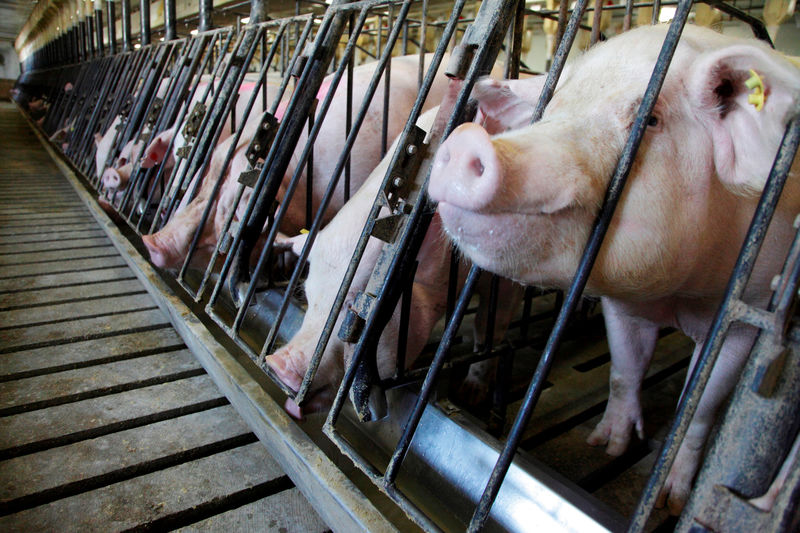By Theopolis Waters and Michael Hirtzer
CHICAGO (Reuters) - American consumers are snapping up plentiful low-cost pork, but U.S. farmers are worried that trade spats with key export markets in China, Mexico and Canada could hurt a lucrative part of their pork business.
The domestic demand outlook remains bright thanks to the strong U.S. economy, upcoming spring grilling season and Easter holiday ham purchases. U.S. goods in general are attractive to foreign buyers thanks to the recent drop in the dollar.
However, trade disputes with China and slow progress in North American Free Trade Agreement (NAFTA) talks have clouded prospects for U.S. pork exports, which are crucial for the industry, as roughly one quarter of pork produced in the United States is exported.
The U.S. Meat Export Federation (USMEF) said U.S. pork exports were on a record pace, with volumes from January through November 2017 of 2.23 million tonnes, worth $5.9 billion. That was up from 2.09 million tonnes, worth $5.4 billion, for the same period in 2016, according to the industry group.
"Without a doubt, our biggest concern is the trade situation," said Steve Meyer, a Kerns and Associates economist and National Pork Producers Council consultant.
President Donald Trump's decision to slap stiff tariffs on U.S. imports of Chinese solar panels and washing machines has sparked fear among pork producers of possible retribution from China, the world's largest consumer of pig meat and the U.S. pork sector's No. 3 market.
China trade is always risky, Meyer said, and "the last deal over washing machines and solar panels didn't help anything."
China is a growing market for U.S. pork, but pork muscle-cut exports trended lower in 2017 as China's domestic pork production increased, said USMEF.
"We live in an interconnected world. And when you put your thumb in someone's eye, they're likely try to jab back and put their thumb in your eye," said Linn Group analyst John Ginzel.
Separately, contentious NAFTA modernization discussions are drawing more attention as the United States spars with Mexico and Canada, the top- and fourth-ranked destinations for U.S. pork by volume. Progress has been slow after several rounds of talks, and concerns remain that the U.S. could withdraw from the agreement.
Canceling the agreement could threaten hog farmers' profits, which have been strong thanks to low-cost feed and strong demand throughout 2017. Those factors also enhanced the bottom lines for packers such as Tyson Foods (NYSE:TSN).
"The hog industry is really strong because everything is lining up right now," said Marshall, Minnesota hog farmer Greg Boerboom. Farmers have cut input costs by using nutrients from pig manure on crops instead of commercial fertilizer, Boerboom said.
As of Dec. 1, there were 73.2 million hogs on U.S. farms, most since 1943, according to the U.S. Department of Agriculture, and packers produced a record 25.6 billion pounds of pork, according to independent industry analyst Bob Brown and Livestock Marketing Information Center’s Jim Robb.
Boerboom said potentially losing NAFTA is a bigger threat to his livelihood than disputes with China because Mexico and Canada share common borders and have been viable markets for the United States.
"You want to keep the customers you have before you start worrying about new ones. So I really think about Mexico, Canada and even Japan and South Korea more than I do China," said Boerboom.
